June 2019 - Highlights and Hot Topics

A Message from NCCDD Chair Alex McArthur
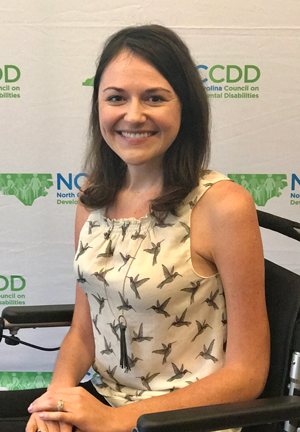 NCCDD Chairperson Alex McArthur
NCCDD Chairperson Alex McArthur
It’s officially summer! We hope that the summertime and sunshine brings you time for rest and relaxation.
And summertime means that NC Council on Developmental Disabilities (NCCDD) has officially opened the nominations process for its upcoming 2019 Leadership and Advocacy Awards.
These three awards are given annually to very-deserving advocates around the state. Read all about the awards below and nominate a very-deserving person by August 5.
As we welcome July, we also welcome the 29th anniversary of the Americans with Disabilities Act. President George H.W. Bush signed the Americans with Disabilities Act into law on July 26, 1990, and even with that milestone, our work still forges on.
NCCDD is compiling a list of celebrations and events for this anniversary to feature on our website. If you know of any happenings to celebrate the ADA Anniversary, send the information to us at [email protected].
As always, we want to hear your ideas. Complete the online form here and share what you feel the NCCDD show know or consider working on for the I/DD community in the State.
Thank you for all you do for people with disabilities in North Carolina!
Alex McArthur, NCCDD Chair

FEDERAL
Education
A bipartisan group of Senators recently introduced the Respond, Innovate, Succeed, and Empower (RISE) Act (S.1585). This bill would streamline the disability service eligibility process by requiring institutions of higher education to
- Accept a student's individualized education plan (IEP), 504 plan, or prior evaluation as sufficient proof of disability,
- Provide transparent information regarding the process of determining eligibility for disability services and to disseminate the information in an accessible format, and
- Report information on the number of students with disabilities served, their outcomes, and provided accommodations.
Health Care
The Department of Health and Human Services (HHS) released a proposed rule which weakens its regulations implementing Section 1557 -- prohibiting discrimination on the basis of race, color, national origin, sex, age, or disability in health programs and activities receiving federal financial assistance -- of the Affordable Care Act (ACA). Some components of this proposed rule include narrowing protections for all people experiencing discrimination under the law, eliminating protections for LGBTQ people, and rolling back protections for people with limited English proficiency.
In an effort to strengthen the ACA, the House of Representatives passed H.R.987, which reverses HHS regulation expanding the use of short-term limited-duration insurance (STLDI). Unlike plans sold on the Exchange, STLDI plans are not required to cover people pre-existing conditions, can charge higher premiums based on age, gender, or health status and more. Additionally, this House bill restores funding for consumer outreach and education programs and the Navigator Program, which were cut by the Administration.
Emergency Preparedness and Management
Two new bills in the House and Senate tackle emergency preparedness and management: The Real Emergency Access for Aging and Disability Inclusion for Disasters Act (REAADI) (S. 1755, HR 3208):
1) Establishes a National Commission on Disability Rights and Disasters to study the needs of individuals with disabilities, older adults and others with access and functional needs throughout emergency preparation and planning, disaster response, recovery and mitigation, and
2) Provides financial support to develop and provide technical assistance and training to state and local emergency managers as well as disaster relief agencies.
The Disaster Relief Medicaid Act (DRMA) (S. 1754, HR 3215) would ensure that Medicaid-eligible individuals forced to relocate due to a disaster maintain access their Medicaid supported services.
STATE
Legislature
Last month, an overview of the House budget was provided in HHT, and the Senate budget was not released yet. Since then, the Senate budget has been released and a Conference Committee was appointed to work out the differences in the two budgets. The budget is expected to be approved early next week. Highlights of budget items include:
- Medicaid Transformation Funds: Both the Senate and the House include dollars to support the transition to Medicaid managed care. Most of this is to pay for the fee-for-service claims that will continue through the transition.
- Expanding Innovations Waiver: The House included 150 slots to begin in March 2019. The Senate budget includes 1000 slots beginning in January 2019. We expect the final budget will be more similar to the Senate version with 1000 slots.
- Traumatic Brain Injury Funding: Both budgets include $2.3 million recurring in each fiscal year of the biennium for TBI services.
- ICF “In Lieu of” Service: DHHS has created an “in lieu of” service definition using community-based supported living as an alternative to an ICF residential setting. This is included in the House budget but not in the Senate. We hope that this will be in the final budget.
- Supplemental Short-Term Assistance for Group Homes: This funding fills a gap created when some people with IDD lost funding due to eligibility changes to Personal Care Services. Both budgets include this funding but the House includes substantially more than the Senate. We expect to see this in the final budget at a compromise between the two amounts.
- Single Stream Funding Cut Change: The House budget revises and decreases the recurring Single Stream Funding reductions that were made previously to LME/MCOs. The Senate budget continues the previous reductions and further reduces Single Stream funding. This will have to be worked out in Conference Committee.
- Group Home Wages: The House budget increases the capitation rates for LME/MCOs, effective January 1, 2020, to enable increases in the wages paid to direct support personnel working in group homes for individuals with I/DD. The Senate budget does not include this line item. While we support increased wages for Direct Support Professionals, we would like to see increases for all DSPs, not just those in GH settings.
- Addressing Unmet Needs in Innovations Waiver: Both the House and the Senate call for a ten-year plan to be developed by DHHS with input from stakeholders to address the waiting list. The House budget also includes funds to determine what is needed to close the disparity between DSP wages in the community compared to DSP wages in state-operated developmental centers. We expect both of these items to be in the final budget.
In general, with the exception of the Innovations Waiver slots, the House includes more provisions for people with I/DD. The hope is for the final budget to reflect the House version and include more Innovations slots similar to the Senate version.
Bills to Follow
HB 619 - An act to establish a Rethinking Guardianship Workgroup to study and recommend changes to current guardianship statutes. This is in line with the work the Council has been doing related to guardianship. PASSED HOUSE. Expected to move through the Senate.
S556 GSC People First Language 2019: This bill updates statutes relating to the provision of services with people first language by changing the phrase "mental retardation" to "intellectual disability" or "intellectual or other developmental disability" and to make further People First Language. PASSED SENATE; expected to move through the House.
H70 – Participation in Health Information Exchange/NC HealthConnex: This bill extends the deadline for certain providers to connect to the health exchange. It also allows for voluntary participation of long-term supports and services and I/DD providers in the health exchange. This has passed both House and Senate and signed by the Governor.
Medicaid Transformation continues to move forward with Standard Plan expected to launch in November. NC DHHS is working with the Prepaid Health Plans (PHPs) on development of their networks of providers.
The Tailored Plan is being developed with a projected launch in July 2021. There have been a series of white papers issued, with the most recent paper being on case management.
Key Points:
- Tailored Care Management will be available to all BH I/DD Tailored Plan beneficiaries continuously throughout their enrollment, unless they receive case management through another service such as ICF.
- Care Management will be provided by a single care manager with expertise and training in addressing behavioral health, I/DD and/or TBI needs in addition to physical health needs and unmet health-related resource needs.
- The intent is for care managers for BH I/DD Tailored Plan beneficiaries to be embedded within provider organizations—primary care practices, or behavioral health or I/DD providers—to support collaboration among providers and beneficiaries. However, care management can be provided by the Tailored Plan entity or an Advance Medical Home.
- BH I/DD Tailored Plans will be responsible for training all care managers serving their beneficiaries and developing training curricula encompassing training topics specified by the Department.
Greensboro Cerebral Palsy Association Celebrates 70 Years
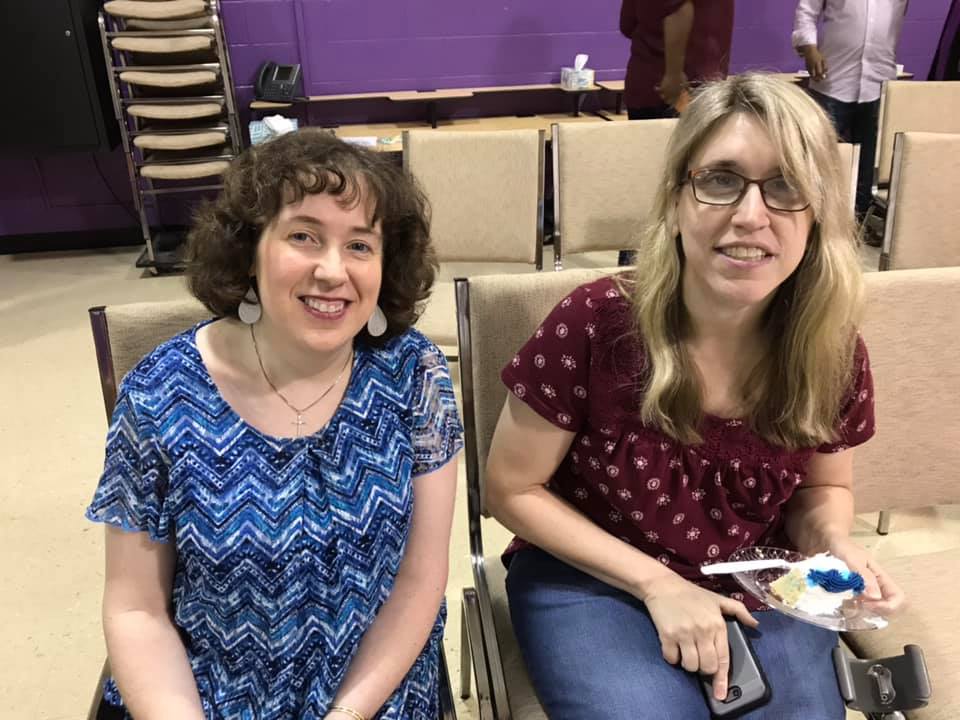 GCPA Program graduates from the 1980s, Susan Kirkman and Denise Greeson.In 1949, Greensboro resident Minnie Lyon Bennett gathered parents of children with cerebral palsy to plan a school for their youngsters, eventually becoming the
GCPA Program graduates from the 1980s, Susan Kirkman and Denise Greeson.In 1949, Greensboro resident Minnie Lyon Bennett gathered parents of children with cerebral palsy to plan a school for their youngsters, eventually becoming the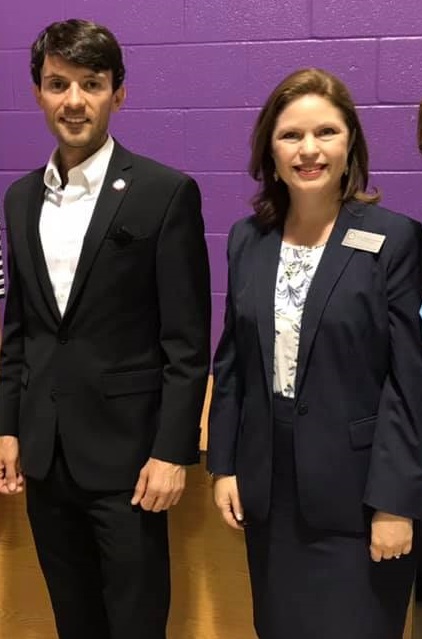 NCR Jon Hardister
NCR Jon Hardister
(R-Guilford) and Julie Emmons representing US Congressman Mark Walker (R-NC 6th District). Greensboro Cerebral Palsy Association (GCPA). With the Junior League of Greensboro and the Greensboro public school system, GCPA grew to impact even more children with disabilities.
On June 3, the organization invited graduates of their program, families, and community leaders to commemorate its 70th anniversary, a testament to what an asset GCPA has been to the Greensboro community.
GCPA’s mission is to serve children, ages birth to three, who are experiencing a wide variety of severe developmental delays and complex medical issues, not just those related to cerebral palsy. The kids work with teachers to meet some or all their developmental goals.
Sara Nachtrab, executive director, said, “Back in 1949, for the community parents and the Junior League to have the foresight to embrace children with disabilities was unheard of. That, along with the school system opening up space for these children was amazing. To this day, we have the support of the school system.”
Governor Roy Cooper honored the GCPA’s anniversary with a letter addressing the significant benefits provided by GCPA and said, “The countless stories of families who have been positively impacted by this outstanding organization are a testament to the association’s commitment to serving its children.”
Visit GCPA’s website for more information.
Nominations Open for NCCDD Awards
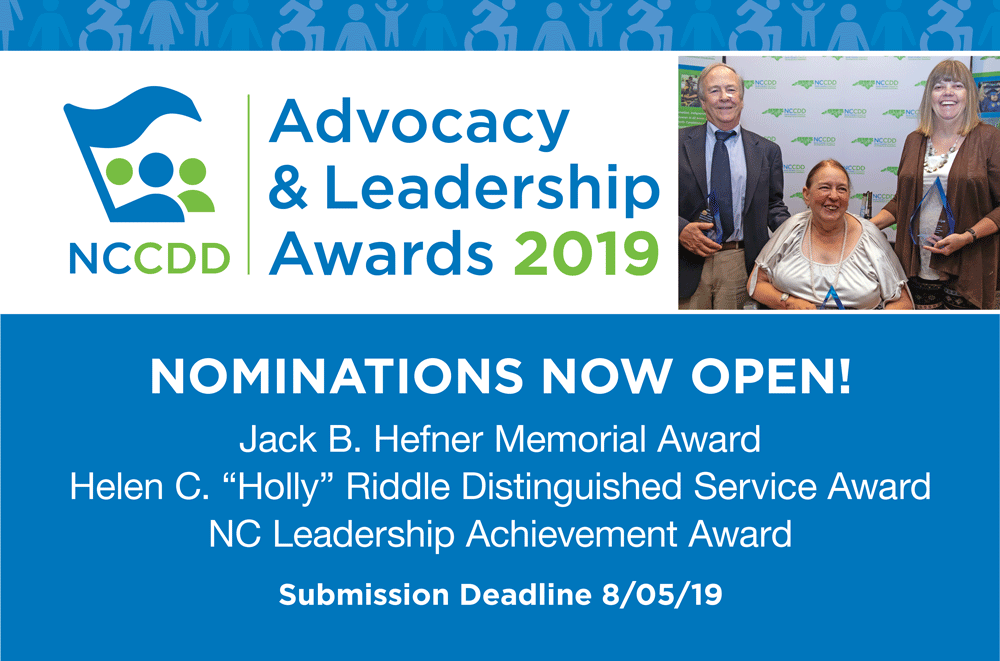 Nominations are now open for the 2019 North Carolina Council on Developmental Disabilities Leadership and Advocacy Awards. The awards will be given to those who best exemplify self-advocacy, building a better inclusive North Carolina and those whose professional work improves opportunities for people with intellectual and/or other developmental disabilities (I/DD).
Nominations are now open for the 2019 North Carolina Council on Developmental Disabilities Leadership and Advocacy Awards. The awards will be given to those who best exemplify self-advocacy, building a better inclusive North Carolina and those whose professional work improves opportunities for people with intellectual and/or other developmental disabilities (I/DD).
The awards are:
- The North Carolina Leadership Achievement Award recognizes an outstanding North Carolina self-advocate.
- The Jack B. Hefner Memorial Award recognizes family members or volunteers who advocate for people with I/DD.
- The Helen C. "Holly" Riddle Distinguished Service Award recognizes professionals who have made lasting contributions towards improving opportunities, breaking down barriers and promoting increased quality of life for people with I/DD. Learn more about the application process and deadline to apply.
NCCDD Launches Conversations with the Council
 NCCDD has launched a new monthly video series called "Conversations with the Council" featuring Council members sharing about their advocacy and Council work, peppered with personal stories about their journey in the world of intellectual and/or other developmental disabilities (I/DD).
NCCDD has launched a new monthly video series called "Conversations with the Council" featuring Council members sharing about their advocacy and Council work, peppered with personal stories about their journey in the world of intellectual and/or other developmental disabilities (I/DD).
The episodes feature Council Members sharing their journeys with each other, and sharing how the Council has impacted their growth as an advocate.The episodes release on the last Tuesday of every month on
NCCDD’s Facebook page. View the latest installment of “Conversations with the Council”.
State Senator Mujtaba A. Mohammed Appointed to NCCDD
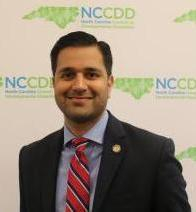 Senator Mujtaba A. Mohammed (D-Mecklenburg)
Senator Mujtaba A. Mohammed (D-Mecklenburg)
has been appointed to NCCDD by Governor Roy Cooper.
He, along with 39 other Governor-appointed Council members, will work
to identify problems facing the community through its five-year planning process and
fund innovative projects and initiatives that promote the goals of the Developmental
Disabilities Assistance and Bill of Rights Act (DD Act) for all North Carolinians.
Read more about Senator Mohammed and what he hopes to achieve on the Council.
En Espanol - June 2019
Audio - Highlights and Hot Topics
